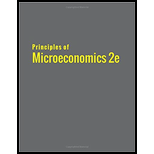Solutions for PRINCIPLES OF MICROECONOMICS (OER)
Problem 2SCQ:
Residents of the town of Smithfield like to consume hams, but each ham requires 10 people to produce...Problem 3SCQ:
A consultant works for 200 per hour. She likes to eat vegetables, but is not very good at growing...Problem 4SCQ:
A computer systems engineer could paint his house, but it makes more sense for him to hire a painter...Problem 5SCQ:
What would be another example of a system in the real world serve could serve as a metaphor for...Problem 6SCQ:
Suppose we extend the circular flow model to add imports and exports. Copy the circular flow diagram...Problem 7SCQ:
What is an example of a problem in the world today, not mentioned in the chapter, that has an...Problem 8SCQ:
The chapter defines private enterprise as a characteristic of market-oriented economies. What would...Problem 9SCQ:
Why might Belgium, France, Italy, and Sweden have a higher export to GDP ratio than the United...Problem 10RQ:
Give the three reasons that explain why the division of labor increases an economys level of...Problem 11RQ:
What are three reasons to study economics?Problem 13RQ:
What are examples of individual economic agents?Problem 14RQ:
What are the three main goals of macroeconomics?Problem 15RQ:
How did John Mayhem Keynes define economics?Problem 16RQ:
Are households primarily buyers or sellers in the goods and services market? In the labor market?Problem 17RQ:
Are firms primarily buyers or sellers in the goods and services market? In the labor market?Problem 19RQ:
What is globalization? How do you think it might have affected the economy over the past decade?Problem 20CTQ:
Suppose you have a team of two workers: one is a baker and one is a chef. Explain why file kitchen...Problem 21CTQ:
Why would division of labor without trade not work?Problem 22CTQ:
Can you think of any examples of free goods, that is, goods or services that are not scarce?Problem 23CTQ:
A balanced federal budget and a balance of trade are secondary goals of macroeconomics, while growth...Problem 24CTQ:
Macroeconomics is an aggregate of what happens at the Microeconomics level. Would it be possible for...Problem 26CTQ:
Suppose, as an economist, you are asked to analyze an issue unlike anything you have ever done...Browse All Chapters of This Textbook
Chapter 1 - Welcome To Economics!Chapter 2 - Choice In A World Of ScarcityChapter 3 - Demand And SupplyChapter 4 - Labor And Financial MarketsChapter 5 - ElasticityChapter 6 - Consumer ChoicesChapter 7 - Production, Costs, And Industry StructureChapter 8 - Perfect CompetitionChapter 9 - MonopolyChapter 10 - Monopolistic Competition And Oligopoly
Chapter 11 - Monopoly And Antitrust PolicyChapter 12 - Environmental Protection And Negative ExternalitiesChapter 13 - Positive Externalities And Public GoodsChapter 14 - Labor Markets And IncomeChapter 15 - Poverty And Economic InequalityChapter 16 - Information, Risk, And InsuranceChapter 17 - Financial MarketsChapter 18 - Public EconomyChapter 19 - International TradeChapter 20 - Globalization And ProtectionismChapter A - The Use Of Mathematics In Principles Of EconomicsChapter B - Indifference Curves
Book Details
Principles of Microeconomics 2e covers the scope and sequence of most introductory microeconomics courses. The text includes many current examples, which are handled in a politically equitable way. The outcome is a balanced approach to the theory and application of economics concepts. The second edition has been thoroughly revised to increase clarity, update data and current event impacts, and incorporate the feedback from many reviewers and adopters. The text and images in this book are grayscale.
Sample Solutions for this Textbook
We offer sample solutions for PRINCIPLES OF MICROECONOMICS (OER) homework problems. See examples below:
Chapter 1, Problem 1SCQChapter 2, Problem 1SCQChapter 3, Problem 1SCQChapter 4, Problem 1SCQChapter 5, Problem 1SCQChapter 6, Problem 1SCQChapter 7, Problem 1SCQChapter 8, Problem 1SCQChapter 9, Problem 1SCQ
Chapter 10, Problem 1SCQChapter 11, Problem 1SCQChapter 12, Problem 1SCQChapter 13, Problem 1SCQChapter 14, Problem 1SCQChapter 15, Problem 1SCQChapter 16, Problem 1SCQChapter 17, Problem 1SCQChapter 18, Problem 1SCQChapter 19, Problem 1SCQChapter 20, Problem 1SCQChapter A, Problem 1RQChapter B, Problem 1RQ
More Editions of This Book
Corresponding editions of this textbook are also available below:
PRINCIPLES OF MICROECONOMICS(OER)
3rd Edition
ISBN: 9781711471495
PRINCIPLES OF MICROECONOMICS W/ACCESS
9th Edition
ISBN: 9781453339503
Principles Of Microeconomics 2e
2nd Edition
ISBN: 9781680922219
PRINCIPLES OF MICROECONOMICS
14th Edition
ISBN: 2810015433490
PRINCIPLES OF MICROECONOMICS (OER)
2nd Edition
ISBN: 9781947172357
PRINCIPLES OF MICROECONOMICS (OER)
17th Edition
ISBN: 9781506698144
PRIN.OF MICROECONOMICS (B+W,LL)
4th Edition
ISBN: 9781732242562
Principles of Microeconomics, 4th edition
4th Edition
ISBN: 9780996996327
PRINC.OF MICROECONOMICS(B+W)(LL) **
4th Edition
ISBN: 2818440084713
PRIN OF MICROECONOMICS EBOOK ACCESS CARD
5th Edition
ISBN: 2818440036859
PRIN.OF MICROECONOMICS (COLOR,PB)
5th Edition
ISBN: 9781732242579
PRIN.OF MICROECONOMICS (B+W) (PB)
5th Edition
ISBN: 9781891002618
PRINCIPLES OF MICROECONOMICS B&W/LL
5th Edition
ISBN: 9781732242593
PRINCIPLES OF MICROECONOMICS COLOR PBK
5th Edition
ISBN: 2818440036842
Related Economics Textbooks with Solutions
Still sussing out bartleby
Check out a sample textbook solution.
